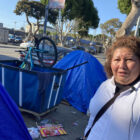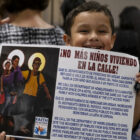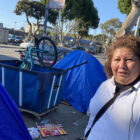Frequent calls to the police to respond to disturbances outside a South of Market homeless shelter have prompted the city to crack down on misbehavior and make it easier for shelters to summarily reject clients seeking a bed.
Practically every day at the Multi-Service Center South shelter, the police are called to break up a fight or quell acts of violence. But the problem isn’t just inside the shelter. Homeless activists say the long lines people must wait in for hours makes the space outside the building a conflict zone.
In a way, homeless people have little alternative to standing in line, because shelters can only accommodate one-fifth of the estimated homeless population. Though the city-funded shelters accommodate 1,139 single adults and up to 10 families nightly, the city estimated two years ago that 6,455 people lived without housing — leaving about 18 percent of the homeless population in the shelter system on any given night.
The new approach, approved last month by the city’s Human Services Agency, will take effect in mid-February. It expands the shelters’ power to deny services, extending it to behavior on the street outside shelters. Previously staff could only intervene for altercations on the premises.
Clients now face immediate removal from the shelter if they behave violently or threaten others outside shelters, and if staff witness the incident. At Multi-Service Center South, on Fifth and Bryant streets, clients can be denied services for up to one year, depending on the severity and the frequency of the behavior — or forever, if they are found to have used weapons.
The rising tensions might be a problem of the shelters’ making. For homeless clients, it can be a time-consuming process to reserve a bed, often offered for just a single night. The limited space available requires waiting in line for hours. The problem may in part solve itself, if the Human Services Agency’s new bed assignment system works. In March it will be rolling out a lottery process that assigns numbers to clients who call ahead through the 311 telephone system, gradually replacing the line-based system.
Homeless activists say the hours-long wait for a bed often triggers a survival mechanism in clients.
“When you’re on the streets, you’ve got to have this toughness about you,” said Will Daley, a shelter advocate at Community Housing Partnership, a nonprofit serving people who are currently or formerly homeless. The organization’s advocates represent clients in disciplinary appeals for infractions, such as smoking or curfew violations.
“There’s this cultural thing,” behind bravado and bluster that may sometimes verge on threatening, he said.
“They’ll talk but it’s just talk,” Daley added. “People are just jawing and posturing. There isn’t any meaning behind it.”
Laura Guzman, director of the Mission Neighborhood Resource Center, a drop-in facility on Capp Street, supports the change in policy, but acknowledges that homeless people find themselves competing for a place in line, and that creates friction.
“Any threat of violence should be taken seriously,” she said. “The truth is when we have someone with that level of anger, the possibility is there.”
Daley said he hopes changing the reservation procedure will alleviate tensions in line, though clients found acting out will still end up with few options once they are kicked out of shelters. “The discussion is how far to go if clients do stuff — and where do they go?” he said.









